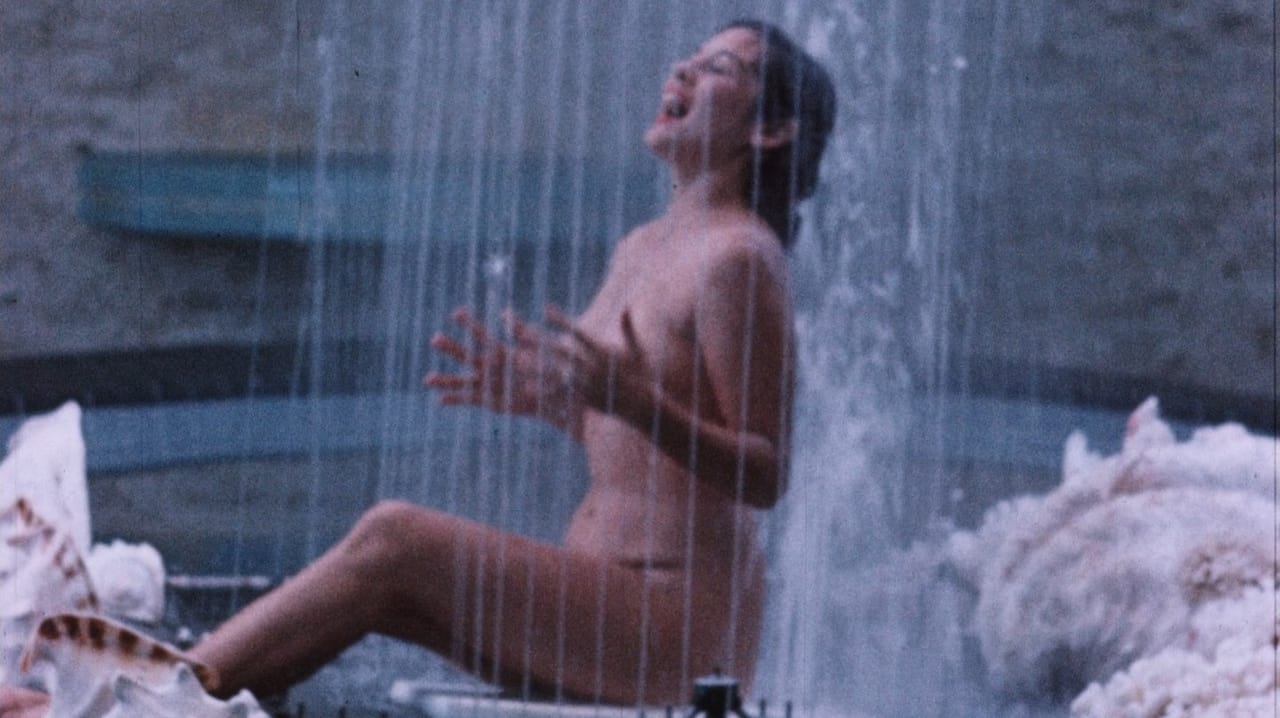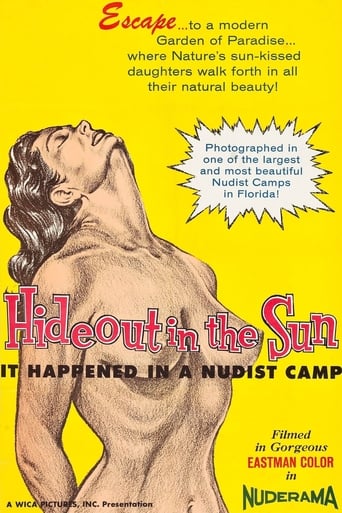

Hideout in the Sun (1960) ** 1/2 (out of 4) The psychotic Duke and his brother Martin rob a bank but their getaway car doesn't start so they must take Dorothy hostage. The brothers agree that it's best to hide out with the victim but what they don't realize is that she lives at a nudist colony. Once there, Martin and Dorothy begin to spend sometime together and soon they fall in love.HIDEOUT IN THE SUN was lost for many decades until a print turned up. Today the film, co-directed by Larry Wolk, is best remembered for being the directorial debut of Doris Wishman. Of course, Wishman would go onto make many "nudist" movies but this here is certainly the best of the lot and I'd strongly argue that this here might be the best nudist movie I've seen. Obviously, it's still not a grade "A" thriller nor is it going to be mistaken for the work of Ingmar Bergman but those who enjoy these types of movies should get a kick out of it.If you've seen any of the nudist movies of the 50s and 60s then you already know that they feature very thin plots that only give the viewer a reason to get into the colony where of course there's all sorts of nudity. The film manages to be quite entertaining not only because of the nudity but the story that is here is actually pretty good. I thought the opening heist sequence was fairly well-shot and there's no doubt that the two brothers are interesting to say the least. Heck, I thought the love story worked a lot better than you'd normally expect. With the story working good enough the nudity was just an added bonus.When this movie was released it was obviously the nudity male viewers were coming for. These scenes, for the most part, are well done and at least most of the people taking their clothes off are attractive. HIDEOUT IN THE SUN isn't a masterpiece but it does manage to be one of the best nudist films out there.
... View MoreJust watched a 45-minute version of this long-lost Doris Wishman "nudie-cutie" on the DailyMotion site. It concerns a couple of bank robbing-brothers holding a young woman hostage as she leads them to a hideout that turns out to be a nudist camp. One of those brothers is sweet to the hostage with her sweet to him in return. Okay, there's an interesting point-of-view shot from the getaway car of the roads of early '60s Miami that caught my attention but after that, it threatened to get really boring even during all those nude scenes where the full frontal parts are either covered or just not shown when the camera is above the waist as they all either dip in the pool or gather at the picnic table. And the dialogue and music will threaten to put you to sleep as well. Speaking of which, the dubbing was off-sync behind the pictures so that was another minus to me. And, like I said, it didn't show the whole thing so I don't know what happened when they tried to get away. Still, if you're curious about this sort of thing, Hideout in the Sun is worth a look. If I ever see the entire version, I may comment further. Until then...
... View MoreWhen her husband died, Wishman was already part of the film distribution industry but, as she explained years later: "I needed to do something that would be so different that it would keep me occupied every second. I didn't know what I was doing when I started production.." The title which kick-started her long career as a cult exploitation director in such uncertain fashion was Hideout in The Sun. The first of several nudist films made by the director until, along with most of the industry she abandoned the genre in the mid-60's, Hideout may not on the level of Nude on The Moon (1961) which was to follow, let alone the delirious excesses of some of her other films as Deadly Weapons (1974) it still retains enough charm, and is characteristic enough of Wishman's work, to be eminently watchable. Whether or not the film is worth such lavish treatment as it has now been accorded in the recently released deluxe 2 disc set will be down to fans and viewers to decide.Combining Dragnet melodramatics and naked frolics in one cheaply constructed package, Hideout is the tale of two brother heisters, Steve and Duke (Earl Bauer and Greg Conrad), on the run after a payroll robbery, forced to hole up in the Hibiscus Country Club which, oddly enough, turns out to be a nudist colony. Along the way they kidnap Dorothy (Delores Carlos), a member of the club, and during their brief stay with the naturists she and Steve find a mutual liking for each other. But even as the anxious and humane Steve finds a new happiness in arms of his winsome nude and her lifestyle "I feel healthy in body and mind for the first time in my life" he says - so equally does the permanently cross and resentful Duke, in hiding and so excluded from the naked goings on, want to leave he's in a hurry to get the ill-gotten gains off to safety. Finally (courtesy of the sparsely attended Miami Serpentarium) events come to a head in a show down with some snakes, a croc and a lone policeman.Hideout in the Sun is distinguished by a title song of the same name that appears, to good effect, thrice in the movie: a mellow ballad which fits in well with the laid back jazz permeating the rest of the soundtrack. The film was also shot on bright Eastman Colour stock which, although the print here (apparently salvaged from a sole remaining version which the director held on to) suffers a bit from the odd tramline and the distraction of missing frames, is still enough to give a vivid evocation both of Dorothy's familiarly innocent lifestyle, as well as being a product of an adult movie industry moment now long past. Much of the dialogue is looped or post-synched, thereby gaining a dreamlike, or distancing effect familiar to those who relish this sort of genre. It also allows Wishman to play on the disassociation between the cruel world outside the Hibiscus club and it's Eden-esquire interior; a timeless sunlit place where naked folks wander around amongst tame flamingos, swans and emus, splash contentedly (if coyly) in pools, play the jiggling handball variant that's was such a prerequisite of contemporary nudist cinema, shoot archery, or just stretch out in the sun with over emphatic casualness. At this stage in the cycle pubes were verboten; instead strategically placed towels and crooked legs cover the necessary areas in studied ways which quickly became a stereotype all of their own.If the Hibiscus Club is a sort of Eden, then it's apt that bad Duke is ultimately consigned to expulsion from the enclave, onto a fate amongst the serpents. But how you respond to Hideout overall depends on how you accept the budding director as the genre 'auteur' that some argue she became. If nothing else, although she was never a woman's libber, Wishman was a feminist role model, a survivor in an industry where men predominated. And if for some 'trash' remains trash, no matter how much fancy pleading is made, I'd argue there is a form of art here, even in her first film, and not just of the naughty postcard variety. (One can imagine how the some story would have been treated, full of sniggers and studio flatness, if it had been given the Carry On treatment, for instance.) It's art of a guileless type, but sneaked in under the cover of 'bad movies'; one of narrative non-sequiturs, where already there's the feeling that the director is going her own fledgling way disorganising narrative just as eventually, in both time and with greater respectability, Godard was to do in the art house much further down the cinematic road. As critic Andrea Juno put it in his piece on the director in the seminal book Incredibly Strange Films: 'behind her economically deprived visuals lies a wealth of imagination: wildly improbable plots, bizarre "method acting" and scripts yielding freely to fantasy '. Whilst the recently long-lost Hideout remains a minor work in Wishman's extensive oeuvre, still unsteady on its feet, it remains junk not to be just thrown away.
... View MorePound for pound, Doris Wishman is the toughest filmmaker in the history o' the silver screen, and "Hideout" is the film that launched the most prolific career of any woman director *ever*. "Hideout" was missing for 40 years after it's original distributor died in jail and took the prints with him. This picture deserves wider exposure and its worth seeking out.
... View More